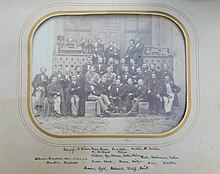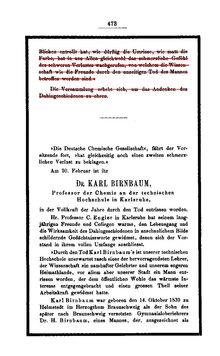Karl Birnbaum (chemist)
Karl Birnbaum (born October 14, 1839 in Helmstedt , † February 20, 1887 in Karlsruhe ) was a German chemist .
Life
Karl Birnbaum was born in 1839 as the son of the high school teacher Dr. H. Birnbaum born in Helmstedt. Interest in chemistry was nurtured by his father, who was a science teacher . After Birnbaum had graduated from high school in Braunschweig, he first studied chemistry at the small Polytechnic School in Braunschweig , then up to the doctorate with Wöhler at the University of Göttingen .
In 1864 he received his doctorate from Wöhler with a thesis on the bromine compounds of iridium . In the same year, on Wöhler's special recommendation, he switched to Karl Weltzien's assistant , the director of the up-and-coming chemical school at the Karlsruhe Polytechnic . Weltzien developed Birnbaum to be his successor in the field of technical chemistry .
In 1868, at Weltzien's instigation, Birnbaum received an extraordinary position for the first time, and with it the management of the laboratory. After Weltzien's death, Birnbaum held the chair for chemistry until autumn 1868. However, the chair was succeeded by Lothar Meyer .
In 1870 Birnbaum was appointed full professor by the Baden Ministry of the Interior and he was given the chair for chemical technology as the successor to Karl Seubert, who died in 1869 . In 1872 he set up his own chemical-technical laboratory for his chair in chemical technology through spatial expansion.
After Lothar von Meyer left in 1876, Birnbaum was given the chair for pure chemistry. The chair for chemical technology has been filled with Carl Engler . For the years 1877/78 he was named director of the Polytechnic . In addition, he was in charge of the food testing station in the Grand Duchy of Baden, founded in 1878.
In the period up to his death in 1887 he was busy writing scientific works. Carl Engler took over his chair.
Scientific work
Karl Birnbaum taught, among other things, the preparation of various iridium and bromine compounds . He also described a series of double salts . He devoted a large number of treatises to the action of sulphurous acid on iridium and platinum compounds . He also dealt with Zeise's salt and confirmed that it contains ethene . He also dealt with the precious metal silver . So he tested the effect of iodine on silver acetate and identified acetic acid among the products . Together with C. Chojnacki, he changed the process of precipitating phosphate from nitric acid solution with bismuth nitrate , which Gustave Chancel had used for the first time . However, this failed to gain acceptance as it turned out to be useless for the analysis of phosphorites . In 1872 he developed a method for testing food. In 1880 he took over the publication of the manual of chemical technology from Pompejus Bolley . Later also the new edition of the textbook of the rational practice of the agricultural trade by Friedrich Julius Otto . In 1884 he was involved in the revision of Merck's dictionary of goods . In addition to his work as a professor, he prepared numerous scientific reports for ministries and other authorities. He was also a member of the Karlsruhe local health council.
Honors
In 1879 he was appointed court advisor and soon afterwards received the Knight's Cross First Class of the Zähringer Lion Order . In 1883 the Grand Duke appointed him a member of the First Chamber of the Baden Estates Assembly , of which he was a member until his death.
Publications
- Chemical analysis guide ; Fifth edition; Karlsruhe, 1885 Seventh edition, Dieckhoff
- Simple methods for checking important foods for adulteration . Gutsch, Karlsruhe 1877 ( digitized edition of the University and State Library Düsseldorf )
- The new book of inventions, trades and industries. Review in all areas of commercial work. ; Seventh edition in 8 volumes; Leipzig, Spamer, 1876 (online)
- Soldering tube book - Instructions for using the so-called dry route for chemical analyzes. Braunschweig, Vieweg, 1872 (online)
- Journal of Chemistry . Leipzig, Quandt & Handel, 1867 (online)
Individual evidence
- ^ Friedrich von Beech (ed.): Badische Biographien , fourth part, Braun, Karlsruhe 1891, p. 29.
- ^ In the 19th century, the right to award doctorates was held exclusively by universities. During this time Weltzien established pioneering chemical research at the technically oriented "polytechnic schools". At the first international chemists' congress in Karlsruhe in 1860, Weltzien advertised among important chemists from domestic and foreign universities.
- ^ Carl Birnbaum, assistant at the chemical laboratory of the polytechnic school in Carlsruhe in July 1864 in Annalen der Chemie und Pharmazie 133 , 161-176 (1865)
- ↑ Birnbaum and Weltzien's papers in the Karlsruhe CTI archive
- ^ Friedrich von Beech (ed.): Badische Biographien , fourth part, Braun, Karlsruhe 1891, p. 29.
- ↑ In 1867 the academic final examination (diploma) was introduced, in 1868 the right to qualify as a professor for mathematics, natural sciences, mechanical engineering and engineering was also granted.
- ^ Karlsruhe Polytechnic School
- ↑ 40 years of the CTI in 1892 , pages LXXII - LXXIV.
- ↑ Karl Birnbaum, About the compounds of ethylene and its homologues with platinum chloride in Annalen der Chemie und Pharmazie 145 , 67-77 (1868).
- ^ Fresenius, R .: Handbook of analytical chemistry. Part III: Quantitative determination and Separation Methods. Volume Va ß: elements of the fifth main group: phosphorus. Determination of phosphoric acid in biological material. Springer Berlin, 1953, p. 152.
- ↑ Ludwig Bauer, Bernhard Gißler: The members of the first chamber of the Baden Estates Assembly from 1819 - 1912. Fidelitas, Karlsruhe 1913, p. 94.
Web links
- Literature by and about Karl Birnbaum in the catalog of the German National Library
| personal data | |
|---|---|
| SURNAME | Birnbaum, Karl |
| BRIEF DESCRIPTION | German chemist |
| DATE OF BIRTH | October 14, 1839 |
| PLACE OF BIRTH | Helmstedt |
| DATE OF DEATH | February 20, 1887 |
| Place of death | Karlsruhe |


